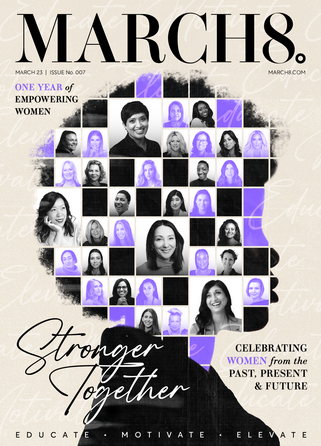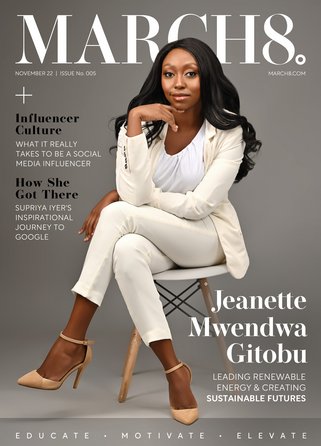Find your voice with T-Mobile’s Stephanie Owen

Reflective, objective and tough. That is how Stephanie Owen, Vice President of Technology and Enterprise Procurement at T-Mobile, describes herself. After sitting down with her at T-Mobile HQ in Seattle, it is also how she comes across. March8 Editor in Chief Lucy Buchholz found out more about how she’s become the successful figure we see today – managing a team of hundreds responsible for tens of billions of dollars ($US) of annual spend – and how she plans to continue driving diversity, equity, and inclusion (DEI) change.
So, start by telling us about yourself and the steps that led you to your current position here at T-Mobile.
My professional career started in the early 90s, where I spent the first 20 years working for Microsoft, or for companies that did a lot of work for Microsoft. During this time, I was also studying for my MBA while being a young mom — you can definitely say that I didn’t take a conventional route into my role. I faced a lot of adversity during that time of my life.
Over the last decade, I’ve been fortunate to work for three other global Fortune 500 companies – Yahoo!, Dell Technologies and BHP Group – while experiencing life in Silicon Valley, California; Austin, Texas; and Singapore. These experiences gave me tremendous opportunities to broaden my perspective, but now I'm thrilled to be working for T-Mobile in my hometown of Seattle.
That being said, when I’m not at work I love to unplug from technology and enjoy the outdoors. I think it’s important to switch gears and to find ways to relax that don’t rely on tech.
How would you simplify your role as Vice President of Technology and Enterprise Procurement, to make it feel like a plausible career for a young girl?
Well, that's a whole lot of words for a title, isn't it? To put it simply, it's my job to find and buy things for T-Mobile’s employees to help them achieve their best work. And that's a lot of fun — it's shopping but much more. In my mind, it’s ‘strategic shopping’ that requires great negotiation skills, a vision toward the future, professionalism and clarity about the bottom line. So we may need to buy computers, insurance programmes, technology to run systems, or office furniture, but whatever we buy, we buy massive quantities.
What are the greatest challenges that you’ve faced throughout your professional life?
When I started my career, I was often the only woman in a room full of men. And in one of my major classes in college, I was one of three female students. Situations like these make it difficult to get your voice heard, so my biggest career challenge has been finding my voice as a woman in the workplace.
It can be hard to find your voice as a leader too. When I first moved from individual contributor to a leader, I had a lot of preconceived ideas about what it meant to be a leader. Over time, I realised that many preconceptions weren’t quite accurate. We are all just doing our best every day, no matter where you are in your career journey. Releasing this earlier on would have given me more confidence.
Why is it important for you to promote DEI initiatives at T-Mobile?
Oh, it is very important. And the platform that I have as a female executive gives me this opportunity, which I take very seriously. When I came here, there was already a team who'd been working to improve and build our relationships with diverse suppliers and with community-based organisations. We've actually received multiple awards and recognition for that work.
In fact, in early 2021, we launched a programme where we gave scholarships to underserved individuals to support them through a specific vocational school, which would lead them to a career in the telecom industry. And we don't call it done there. We ensure that they graduate, secure a job, and continue to be employed in that sector. I'm really proud to say that our NextTech Diversity Program – supported by T-Mobile and other companies in the wireless industry – graduated 50 people during its inaugural year. Even better, 100% of those women and men of colour have been placed in career telecom positions. We’re continuing the programme and have even expanded our focus to train and place three-times the number of people during 2022.
Technology is predominately a male-dominated industry. Why do you believe it is important to encourage girls and women to join the sector?
It’s so important to encourage girls and women to pursue science, technology, engineering, and mathematics (STEM) careers, because there are still misconceptions in many parts of the world that these subjects are best suited for males. As women, we need to understand that we can be good at anything we choose.
T-Mobile has a solid track record of creating opportunities for diverse employees. We say it all the time: “Diversity, equity and inclusion are part of our corporate DNA.” We also embrace what our President of Technology Neville Ray calls our “always on” approach to work. “We Won’t Stop” is a tagline we use that I think applies to many aspects of our focus and results.
When it comes to women in male-dominated industries, my career includes work in the global mining industry. Many mining and energy companies aim to have a 50/50 male and female balance in their workforce within the next five to 10 years. Well, that's a pretty daunting task when it's nearly 100% male today. So, there are a lot of fields that are opening to women, and I highly encourage girls to believe in their capabilities, to understand their worth and to know that sometimes, we can do things better than our counterparts.
How has T-Mobile worked to build inclusive teams?
When building a diverse team, we have an opportunity to use the process to make objective, inclusive decisions, to check for bias and hopefully hire someone who brings a new perspective to the team — here at T-Mobile, this is very important to us.
When I started here two years ago, I was fortunate to inherit a really strong team. But I’ve also learned the importance of uncovering talent within individuals across the business, by connecting them with a business problem and allowing them to find a solution. Too often we think in terms of hierarchy and set limitations on people because they may be too junior, or haven’t been at the company for long enough, for example.
I would like women to think more about the different opportunities available to them, whether that’s a new job role or a project within the workplace. When women look at job descriptions, I’d like them to ask themselves, ‘what experience and background can I bring to this team?’, and then to pursue the role whether or not they tick every box. That way, hopefully more leaders’ eyes will open and they will think about who they're selecting.
If you could have a conversation with your younger self, what advice would you give?
I would tell myself, and everybody else, that you already have everything that you need to be successful inside of you. It's not about finding something else or seeking validation from elsewhere. You have things to learn and experiences to gain, yes, but that just requires dedication, discipline, and action over a period of time. But there's nothing that you don't already possess to achieve success.
Looking back, is there anything you would have done differently?
Absolutely — I would have told myself: “Raise your hand earlier!” I think as women, we put our heads down, do our work and wait to be recognised, but it doesn't necessarily work that way in business. You also have to speak about your work, evangelise it and step out of your comfort zone perhaps. It took me a long time to become bolder with my actions, and I wish I would've done it sooner.
Featured Articles
B Corporation certification has long been hailed as the gold standard of sustainability – we explore why
How does a retail investor replicate, as closely as possible, a venture capital investment strategy? Paula Tavangar of SwissBorg Ventures explores
Michelle Li shares how parents can ensure their children are taking the right steps to a more sustainable future



